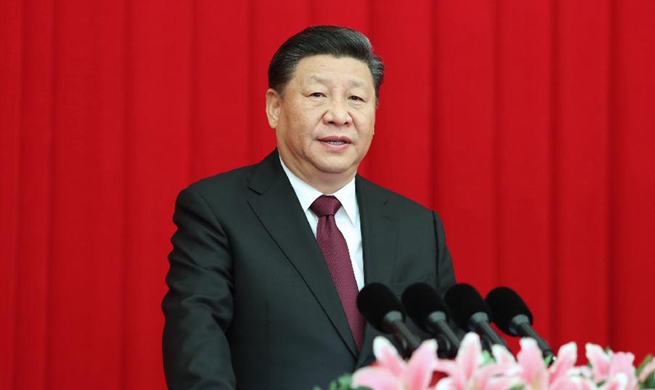By Xinhua Writer Luan Xiang
BEIJING, Dec 31 (Xinhua) - China has strengthened law enforcement efforts against the smuggling of totoaba, a fish native to the Gulf of California.
China Customs announced this week the results of a lengthy operation to bring down illegal totoaba swim bladder smuggling rings in "one of China's most successful operations combatting the illegal wildlife trade," according to an official communique.
Customs offices in Jiangmen and Nanning carried out the operation named "SY608" across numerous cities in southern regions of Guangdong and Guangxi, which led to the arrests of 16 individuals representing one of the main trafficking syndicates in totoaba swim bladders, confiscating over 444 kg of totoaba swim bladders worth and estimated RMB 182 million.
Though the investigation is still ongoing, preliminary results show that syndicate purchased the swim bladders in Mexico then transport them through multiple transit points using suitcases before entering the country to be sold illegally.
"There is only a very small and confined illegal market for totoaba swim bladders in China. And in the short time since they started appearing on the black market, China has quickly shut down open sales and now has cracked one of the main smuggling rings," said Steve Blake, chief representative of WildAid in China.
"As enforcement in China is increasingly effective, we hope to see continued international cooperation in combatting illegal fishing and transit of these products."
VAQUITAS NEXT FOR EXTINCTION
The totoaba is a fish found only in Mexico's Gulf of California, and has been listed as a CITES Appendix I species since 1976, prohibiting international trade in any of its products, and listed as critically endangered by the IUCN in 1996.
The totoaba shares its habitat - recognized as a biosphere reserve - with the world's smallest porpoise and most endangered marine mammal, the vaquita. Recent research shows that there only 12 vaquitas on the planet, so it is almost certain for extinction.
The gill nets designed to catch totoaba are also the perfect size for trapping vaquitas, who ended up tangled and drown
Decades of destructive fishing practices and rampant use of illegal gill-nets to poach totoaba have decimated the vaquita population, declining from 600 in 1997 down to 30 in 2017.
In December last year, a last-chance plan to preserve the species by capturing them to breed in captivity had to be abandoned after two specimen died from stress.
The only hope for the vaquita now rests with Mexico, China and the international community's joint efforts in stopping the illegal fishing of totoaba, according to experts.
"Otherwise, it is very unlikely that we are going to have vaquitas in a couple of years," said Barbara Taylor with the US National Oceanic and Atmospheric Administration.
The vaquita is estimated to be extinct by 2022, unless illegal fishing can be curtailed, she said.
The vaquita is a small porpoise endemic to the Gulf of California that reaches about 5 feet in length and about 120 pounds in adulthood. It is the only porpoise species to live in shallow, warm water and locally nicknamed "pandas of the sea" due to the dark patches around their eyes.
The Mexican government has recently tightened its laws against illegal fishing but this has proved little deterrent, due to the high rewards for totoaba in the black market.
CHINA COMMITS TO CRACK DOWN ON TOTOABA TRAFFIC
At the 17th Conference of the Parties to the Convention on International Trade in Endangered Species of Wild Fauna and Flora (CITES), held in October 2016, a special resolution was enacted on the illegal fishing and illegal trade of totoaba.
The resolution requires strengthening of customs inspection, and that anti-smuggling activities relating to the fish, its products and law enforcement activities are submitted to the convention.
At the end of the same year, China's Ministry of Agriculture, market regulation agencies of the State Administration for Industry and Commerce and the Endangered Species Import and Export Management Office held a training seminar on the implementation of the CITES solution regarding totoaba trafficking in Guangzhou.
Hundreds of frontline law enforcement officers from fisheries, industry and commerce, marine police and customs in major cities in Guangdong Province, were trained to better identify totoaba products, share information and strengthen anti-smuggling cooperation.
"Ending the illegal trade of totoaba requires the joint efforts of all the countries concerned," said Meng Xianlin, an official in charge of the affair.
"The Chinese government is willing to join hands with the source, transit and destination countries such as Mexico and the United States, to work out a comprehensive policy for both the symptoms and the causes and to strive to achieve effective results as soon as possible," he said.
Steve Blake of WildAid said: "The illegal trade of totoaba is a relatively small and a closed market. The fact that China was able to accurately destroy a major criminal ring in such a short period of time is evidence that China has strong and effective law enforcement capabilities."
"We hope that in the future, countries such as Mexico and the United States and the involved countries of transit can strengthen their exit and entry control and jointly fulfill their obligations under the convention."
In a series of campaigns, customs and nonprofit organizations in China have been reminding local consumers that totoaba has no magical effect, and suggestions that it cures cancer have no scientific nor clinical foundation.
The totoaba from the Gulf of California is an endangered species under the equivalent protection as elephants, rhinos, and pangolins, which are protected by international conventions and Chinese law.
Smuggling endangered species is a crime in China that will be held liable and punished by law. China has launched joint operations, including "Sword at the National Gate 2018," to target wildlife trafficking this year.
"When the buying stops, the killing could too." Blake said.

















